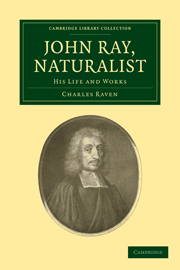Book contents
- Frontmatter
- Contents
- Preface
- Introduction
- ABBREVIATIONS
- Chapter I Boyhood and Youth
- Chapter II At Cambridge University
- Chapter III First Studies in Science
- Chapter IV The Cambridge Catalogue
- Chapter V The Years of Travel
- Chapter VI The English Catalogue
- Chapter VII The Years of Varied Output
- Chapter VIII The Structure and Classification of Plants
- Chapter IX The History of Plants
- Chapter X The Flora of Britain
- Chapter XI Last Work in Botany
- Chapter XII The Ornithology
- Chapter XIII The History of Fishes
- Chapter XIV Of Mammals and Reptiles
- Chapter XV The History of Insects
- Chapter XVI Of Fossils and Geology
- Chapter XVII The Wisdom of God
- Conclusion
- Index
Chapter IX - The History of Plants
Published online by Cambridge University Press: 07 September 2010
- Frontmatter
- Contents
- Preface
- Introduction
- ABBREVIATIONS
- Chapter I Boyhood and Youth
- Chapter II At Cambridge University
- Chapter III First Studies in Science
- Chapter IV The Cambridge Catalogue
- Chapter V The Years of Travel
- Chapter VI The English Catalogue
- Chapter VII The Years of Varied Output
- Chapter VIII The Structure and Classification of Plants
- Chapter IX The History of Plants
- Chapter X The Flora of Britain
- Chapter XI Last Work in Botany
- Chapter XII The Ornithology
- Chapter XIII The History of Fishes
- Chapter XIV Of Mammals and Reptiles
- Chapter XV The History of Insects
- Chapter XVI Of Fossils and Geology
- Chapter XVII The Wisdom of God
- Conclusion
- Index
Summary
Our countryman, the excellent Mr Ray, is the only describer that conveys some precise idea in every term or word.
Gilbert White to Daines Barrington, Letter X, i August 1771.The publication of the Methodus marks the close of the first half of Ray's career as a scientist. By it he had fulfilled a threefold obligation laid upon him by the embarrassing request of Bishop Wilkins, by the failure of the Tables, and by the requests of his friends; and so had completed the first phase of his botanical studies. Hitherto his life had been unsettled: he had turned his enforced homelessness to good account, collected a mass of material, discharged his debt to Willughby, and done good service to British botany. But opportunities for large-scale work in his own field had been scanty. He was not master of his time or circumstances, and could not settle down to uninterrupted study or plan a long piece of research. Only when he had finally moved to Dewlands and renounced all prospect of further travel or of promotion could he begin the larger tasks for which his experience fitted him. Lists of synonyms and localities and a scheme of classification were, as he now realised, the proper prelude to a larger undertaking, a History of Plants which should not merely catalogue but describe, which should not be confined to Britain or Western Europe but include all known species, which should not be alphabetical or arbitrary in its arrangement but should illustrate, expand and modify his Method.
- Type
- Chapter
- Information
- John Ray, NaturalistHis Life and Works, pp. 202 - 242Publisher: Cambridge University PressPrint publication year: 2009First published in: 1942



